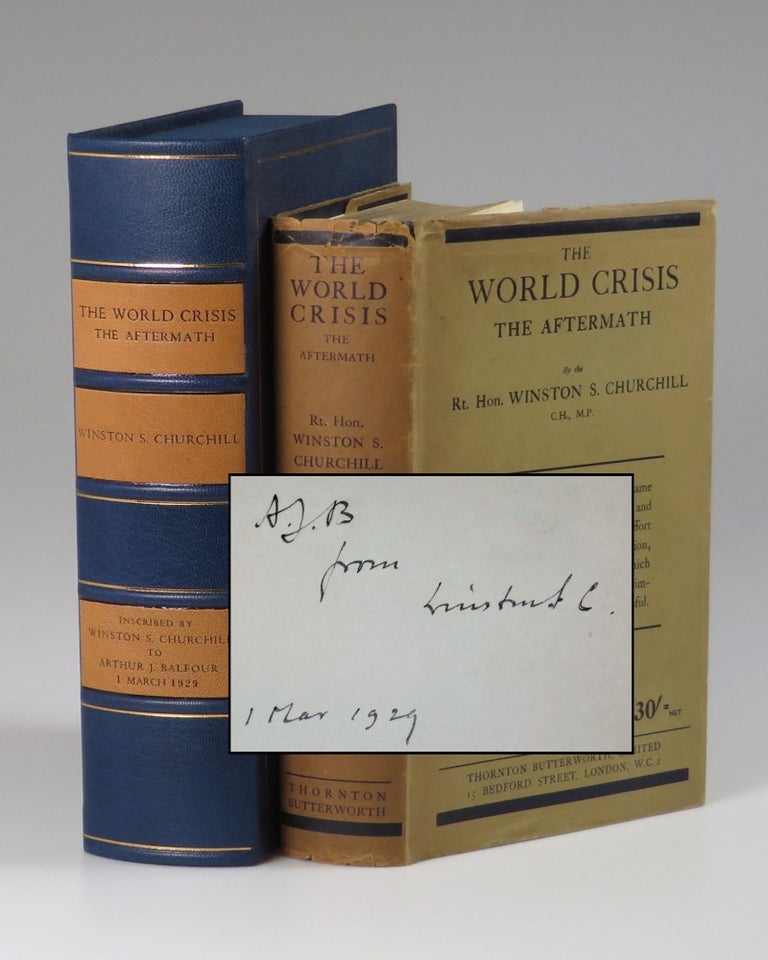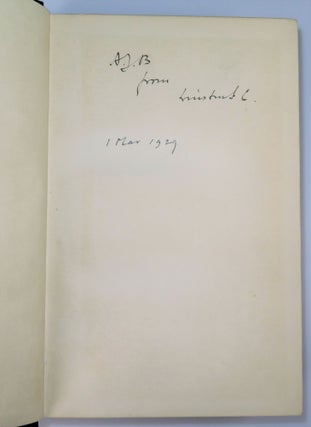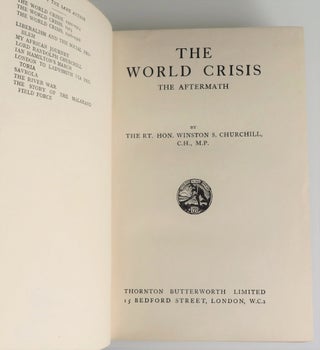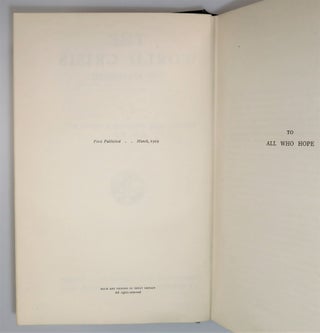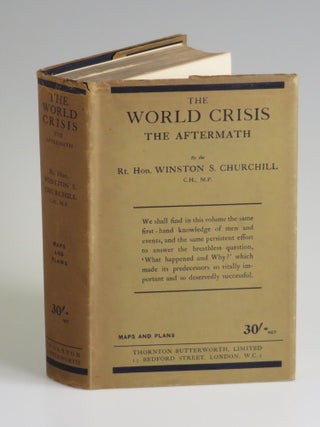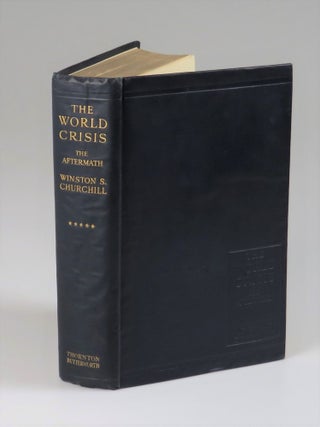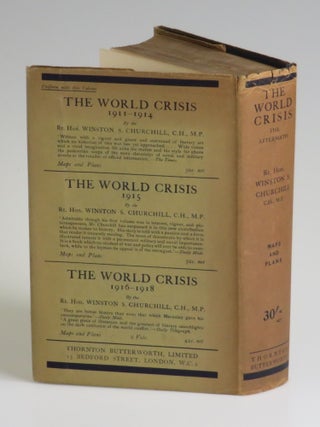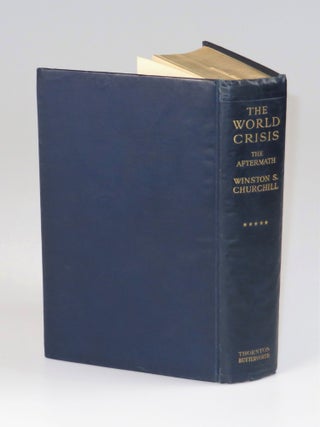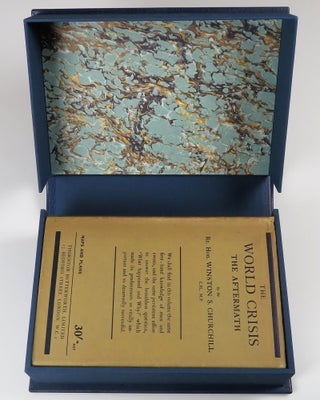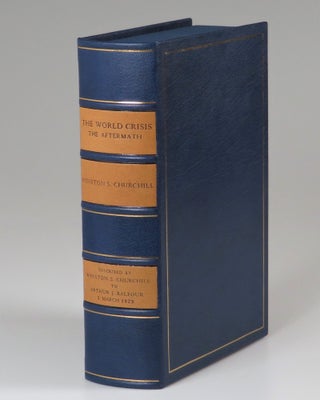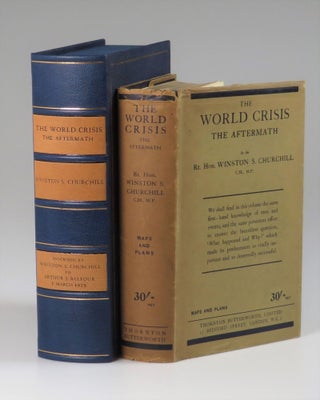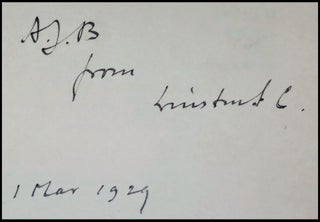"A. J. B. from Winston S. C. " - The penultimate volume of The World Crisis, Winston Churchill's history of the First World War, inscribed and dated six days prior to publication by Winston S. Churchill to former Prime Minister Arthur J. Balfour, the man who replaced Churchill as First Lord of the Admiralty when Churchill was forced to resign and "whose friendship, across the vicissitudes of politics" Churchill "enjoyed in a ripening measure during thirty years"
London: Thornton Butterworth Limited, 1929. First edition, first printing. Hardcover. This is a remarkable association copy of the penultimate volume of Winston S. Churchill’s history of the First World War. This jacketed first edition, first printing of The Word Crisis: The Aftermath is inscribed and dated to Arthur James Balfour, the man who replaced Churchill as First Lord of the Admiralty in 1915 when Churchill was forced to resign. Churchill’s own words testify most eloquently to his association with Balfour, which both included and exceeded that of a colleague, mentor, or rival: “…this remarkable man whom I knew, and whose friendship, across the vicissitudes of politics, I enjoyed in a ripening measure during thirty years.” (Churchill, Great Contemporaries, p.240)
The inscription
Churchill inscribed this presentation copy of the first edition, first printing, first state of The Aftermath six days prior to publication. Using their respective initials, the tone is familiar, befitting their long association, and the first and third lines have a hint of playful versification. Inked in four lines, the recto of the blank sheet preceding the half title reads: “A. J. B | from | Winston S. C. | 1 Mar 1929”. This was the last book Churchill published during the recipient’s lifetime; Balfour died a year later.
Condition
Condition approaches very good overall in a very good plus dust jacket. The navy cloth binding is square, clean, and bright, with vivid spine gilt, sharp corners, and only trivial shelf wear confined to extremities – all consonant with a jacketed copy. Unfortunately, the otherwise well-preserved cloth suffers significant blistering, endemic to the edition. In this case the spine is most affected, but also the cover edges and the upper front cover. The contents are uncommonly clean for the edition, crisp and bright with no spotting or previous ownership marks other than the author’s inscription. First state of the first edition, first printing, is confirmed by absence of an errata at p.9. We note only minor age-toning and incidental dust to the top edge of the text block. The binding remains firmly attached, despite a cosmetic split at the final free endpaper gutter showing a narrow glimpse of the fully intact mull beneath. The dust jacket is complete apart from fractional chipping to the spine ends, and notably clean, with modest, uniform spine toning. There are short closed tears and wrinkling to the top .5 inch of the spine head. The inscribed volume is housed in a full, dark blue Morocco goatskin Solander case with rounded spine, raised and gilt-rule framed spine bands, tan Morocco spine labels, gilt rule-bordered covers, and marbled paper lining.
The association
Arthur James Balfour, first earl of Balfour (1848-1930) was among the most significant influences and associations of the first half of Churchill’s political career. The two were already tethered by friendship and politics when Winston was born, and during Winston’s first three decades in Parliament they were almost perpetually connected by oscillations of alignment and opposition, of concurrent and opposing political ascendance.
Balfour was friends with Winston’s father, Lord Randolph Churchill, and supported Winston in his early endeavors, including publication of his first book and his first election to Parliament. It was in late May 1904, during Balfour’s 1902-1905 premiership, that young Winston dramatically left the Conservative Party and crossed the aisle to become a Liberal. In late 1911, within weeks of Churchill’s appointment as First Lord of the Admiralty, Balfour resigned as Conservative party leader, a casualty of Conservative losses to the Liberals in policy battles championed by Churchill.
Arguably, Balfour’s most important legacies and most potent time in power came in the years that followed. Moreover, the First World War and its aftermath – apropos the title of the inscribed work in question – tethered Balfour and Churchill even more than had the preceding decades. On the Dardanelles – the strategic initiative that would end Churchill’s tenure at the Admiralty, the two men were in accord. Indeed, Balfour “argued persuasively in favor” – of Churchill’s proposal to attack the Dardanelles with ships alone. (ODNB) When the Dardanelles disaster engulfed Churchill and forced his resignation, it was Balfour who succeeded Churchill as First Lord of the Admiralty.
It is worth noting that Balfour anticipated the weapons that would revolutionize naval warfare in each world war – the submarine in the First and the aircraft in the Second. Later, as Foreign Secretary, Balfour did much to “smooth the way for American co-operation” in the war effort. And it was the Balfour Declaration that formally stated that the British government supported “the establishment in Palestine of a national home for the Jewish people’ – a frankly Zionist position to which Churchill would also commit. As Churchill would later be to the genesis of the United Nations, Balfour was committed to the U.N.’s ill-fated forerunner, the League of Nations, serving as Lord President of the League’s Council from 1919-1922. Their final service together was in the government of Prime Minister Stanley Baldwin; from 1925-1929, Balfour served as Lord President of the Council while Churchill served as Chancellor of the Exchequer.
On 1 March 1929 – six days before publication – Churchill inscribed this volume for Balfour. In the autumn of 1928, ill-health had finally removed the octogenarian Balfour from active work. Balfour died two years later. When Churchill published his Great Contemporaries in 1937, an entire chapter (pages 237-57) was devoted to Balfour.
The edition
A quarter of a century before the Second World War endowed him with lasting fame, Winston Churchill played a uniquely critical, controversial, and varied role in the “War to end all wars”. Then, being Churchill, he wrote about it. The World Crisis was published in six volumes between 1923 and 1931. The first four volumes span the 1911-1918 war years, with two supplemental volumes. This fifth volume, The Aftermath, covers the postwar years 1918-1928 – a decade-long span during most of which both Churchill and Balfour served in high Government office. As the title implies, the sixth and final volume, The Eastern Front, covers the eastern theatre.
The British first editions are handsome, but the smooth navy cloth bindings proved quite susceptible to wear, the contents quite prone to spotting and toning. Moreover, the cloth binding of this fifth volume (the one inscribed to Balfour) proved particularly susceptible to blistering – delamination of the binding cloth from the binding structure beneath.
First editions in dust jackets – let alone inscribed presentation copies – are an elusive prize. When these volumes were published, between 1923 and 1931, booksellers often discarded the dust jackets. Even those spared by booksellers often did not survive.
Reference: Cohen A69.2(IV).a, Woods/ICS A31(ab); Langworth p.105. Item #006705
Price: $24,000.00

